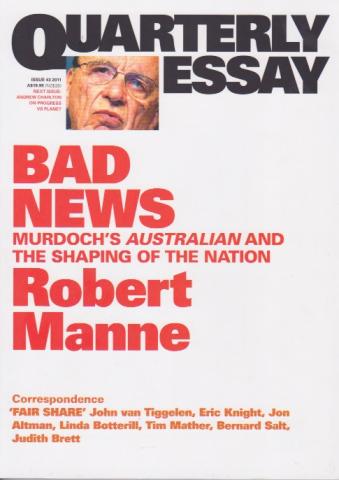THERE is a publication in Australia where for every one story you read which agrees society should take firm steps to combat climate change, there are four stories suggesting we shouldn’t.
When climate change is viewed through the pages of this publication, most of the world’s “experts” think it’s either not happening, not worth worrying about or not caused by humans.
Advocates for strong action on climate change are variously described as “prophets of doom”, “greenhouse hysterics” or “hair-shirted greenhouse penitents”.
As extreme as these positions might appear, this publication is not a newsletter from a fringe group or a bulletin from the Tea Party.
This is the divisive state of climate change science in the pages of the nation’s sole national newspaper The Australian, according to a 115-page examination of the publication’s role in shaping how Australia thinks.
The essay – Bad News (paywalled) – is written by author Professor Robert Manne, one of the country’s leading political thinkers.
In an excerpt from his essay, published in The Age, Manne writes
As we shall see, what The Australian has contributed on climate change under editor Chris Mitchell’s watch is a frightful hotchpotch of ideological prejudice and intellectual muddle
The Australian’s owner is Rupert Murdoch, who in 2006 said the planet deserved “the benefit of the doubt” and that it was now time to “take a lead” on the issue.
Manne analysed climate change articles printed by The Australian between January 2004 and April 2011 and found that 700 articles were “unfavourable” to action on climate change.
That is, they either disagreed with the consensus of climate science, didn’t support Australia’s ratification of the Kyoto protocol or didn’t support previous governments’ steps towards a carbon trading scheme.
Balanced against these 700 articles, there were 180 stories and columns “favourable” to action on climate change.
Climate skepticism and denial also heavily dominated the newspaper’s columns and opinion articles, Manne found.
Dozens of articles were published by “scientists” which rejected the consensual view.
Sceptics including Bob Carter, Ian Plimer, Christopher Monckton, Richard Lindzen, David Bellamy and John Christy were all given space in The Australian.
In particular, Bob Carter wrote nine articles, Bjorn Lomborg penned 25 and two members of the Australian “free market” think-tank the Institute of Public Affairs, well known for dissemination of climate denial, wrote 16 articles.
Contributions from recognised climate science experts, such as James Hansen and the immediate past president of the Australian Academy of Science Professor Kurt Lambeck, were outnumbered by ten to one.
Among The Australian’s in-house regulars, Manne documents the “comical degree of self-confidence” with which its writers disagreed with established climate science.
While in its official editorials, The Australian has said it accepts the science of climate change, Manne looks closer at the newspaper’s record.
In its coverage of climate change, The Australian had failed to acknowledge the distinction between genuine expertise and “contrarians or cranks” and had “threatened the always vulnerable place of reason in public life”.
Manne’s essay is just the latest to question The Australian‘s coverage of climate change.
Astrophysicist Michael Ashley recently documented on The Conversation the newspaper’s questionable record and described its climate change coverage as resembling an “event horizon” where “our normal perception of reality is so completely overturned”.
In a long-running series, Tim Lambert’s Deltoid blog has been documenting The Australian’s “war on science” – a list of errors and misrepresentations – which is currently up to 70.
In a profile of The Australian’s editor Chris Mitchell, published in the August issue of magazine The Monthly, it was revealed that News Limited’s environment and climate change manager Dr Tony Wilkins had himself canceled his subscription to The Australian over its coverage of climate change.
When a former journalist at The Australian complained during a conference last year that writing on climate change for the newspaper had been “torture”, Mitchell threatened to sue academic Julie Posetti, who had tweeted the comments.
Legal letters went backwards and forwards in what became known as #Twitdef – the hashtag used by followers of the case on Twitter. The threat has not been withdrawn.
Subscribe to our newsletter
Stay up to date with DeSmog news and alerts







